- Home
- Chuck Palahniuk
Burnt Tongues Page 19
Burnt Tongues Read online
Page 19
When I shrunk away and didn’t touch my girl for a month, we ended up off-again. Which brings you and I up to date.
So consider this story a favor and a warning. But I don’t recommend spreading this around too generously. And whatever you do, don’t mention you heard it from me. There’s still a chance we’ll be on-again. I forgive easy. I’m loyal like that.
Tell a priest or something. Get online. Being the guy who knows the guy who fucked the girl who fucked a dog will ruin your name in the party scene. Guilty by association. Same reason kids named Adolf or Osama might have trouble making friends.
And don’t think I’m passing judgment here. But I’m not condoning anything, either. I’m just an imperfect man making sense of an imperfect world.
If this were a perfect world, girls could have all the sprawling luxury sedans, angular sports cars, top-shelf booze, and sparkling rocks they think will fill the hole in their heart instead of changing their names to objects. In a perfect world, who we are would be enough. We wouldn’t need to masquerade behind leather masks and net handles in search of self-actualization.
People wouldn’t exploit one another, and there would be enough happiness for all. There would be a home for every puppy.
But ours isn’t a perfect world.
This story, her unloved mutt, I can’t care for it any longer and have left it in a box marked free.
And you can swear to anyone who’ll listen—hope to die, stick a needle in your eye—that this is a true story.
Because it is.
And now it’s yours.
Engines, O-rings, and Astronauts
Jason M. Fylan
That day we passed a lot of coded notes, our plans for Freddy.
Early the next morning, Mrs. Alphabet spent the first ten minutes of class staring at his empty desk.
I didn’t kill Mrs. Alphabet, but I helped. We all did.
When she snapped out of it, she said, “Okay, then. How about a nice class picture?”
We helped Mrs. Alphabet set up the automatic camera on the tripod, and she lined us all up against the chalkboard. Third guy from the left, back row, Terence, check out the expression on his face. Everyone else stands squared up straight and smiling at the camera, but T captures something else to the side, his eyes wide, mouth open. The same expression Mrs. Alphabet had a month earlier when we’d watched the space shuttle Challenger explode live, throwing engines, O-rings, and astronauts all over the sky and into the ocean.
Mrs. Alphabet’s real name had too many consonants for a class that could barely add two plus two. Our parents didn’t like her on account of her being a “camel-riding AY-RAB” from “out there in the holy shit-hole desert.”
But she was a place to dump us, their high-maintenance SpEd class kids, while they used their eight unburdened hours make believing lives without special children.
The red fiery burst of shotgun found Mrs. Alphabet first, like a big stick of Acme cartoon dynamite blowing up inside her stomach.
Every year there’s a candlelight vigil, and the few survivors, we all say we’ll be there. This year it’s just me and Terence. Afterward we meet up at the Barley House on the west side of town and take the booth way in the back, away from the bohemian hipster jack offs and college kids. We get a couple pitchers, joke around, look at photos of each other’s kids, high-five about all the girls we’ve fucked, and part ways. I won’t see or speak to T until the same time next year, if even.
T’s mom died right before his seventh birthday, and by the sixth grade the poor kid broke down if you looked at him sideways. On Freddy’s first day, T tried playing ambassador and introduced himself to Freddy, who responded by calling him a “retarded, penis-haired, chocolate faggot-faced nigger.” Little Terence Moore, in his tan corduroys and striped JCPenney dress shirt, burst into tears, stomped his feet, ran over to a tree, and sat down with his face in his hands, little huffy shoulders bouncing up and down.
That same recess, Freddy pulled down Monica Jordan’s pants, spat in Erica Veneer’s hair, broke Sam Gifford’s Pac-Man watch, and shoved this pathetic fat kid Herman Wesley face-first down some stairs.
As we walked inside, Mrs. Alphabet passed us in the hall, marching Freddy down to Principal Gathers’s office. Freddy flailed around, kicked, screamed, shot milky green snot bubbles out his nostrils as foam fell from his mouth and a dark stain ran down his left pant leg.
After they went by, Colin Sterling said he had a feeling the new kid’s soul was darker than the bottom of an empty pop can, and he pretty much nailed it.
When Mrs. Alphabet came back without Freddy, she told us we had to be nice to him on account of his hard, sad life and his daddy dying a couple of months back.
“Children,” she said, “what do we do for people who are sad?”
We all responded in unison, ever the obedient cult: “Happy words make happy hearts!”
A little later, Freddy returned, sat down, and dropped his head on his desk.
Right before the buses came, when everyone was trying to make nice with him, Freddy told us he’d scored high on a “QI” test at his old school and didn’t belong in a “fat, faggot, retard, spazzy SpEd class” like ours. And that him and his daddy used to shoot guns at birds and listen to Judas Priest, he set off a stink bomb at his daddy’s funeral, and he’d once seen a magazine where two naked women were squeezing each other’s tits and eating one another “down there.”
Two days before the class photo, we’d pushed Mrs. Alphabet’s love and tolerance all the way to the edge. The lines on her face creased deeply, the spaces beneath her eyes red and splotchy as she fondled a framed photo of some people standing together in the desert. After Matilda drew the shortest straw and asked her why she was sad, Mrs. Alphabet said when holy people take up arms against one another, good and bad fades, leaving only “hip-o-crits” betraying God by killing in his name.
“When you do something very bad,” she said, “then the Devil made you do it.”
She’d told us twice to settle down. Normally the third strike meant her piercing, scary “Palestinian scream” and deleted recess. But that day, she just got up and walked out. When she came back fifteen minutes later, everyone shut up and stopped jerking around, sat in their seats, and went back to reading. Except Freddy and me.
While Mrs. Alphabet took her walk, Freddy had tied a thin wire between our desks and told me he’d kill my mom if I said anything.
He raised his hand, and Mrs. Alphabet, her eyes dead and distant, shuffled over to him. Her foot caught the wire, whipped her to the floor, and smashed our desks together right on top of her. She sat up screaming, her dress yanked up to her chest, her hands scraped and filthy, lines of blood like black firecrackers exploding across her face. Some other teachers ran in and helped her, and we finished the day with Mrs. Adonis, the weird librarian who smelled like roses and cheese.
The next day Mrs. Alphabet hobbled in with a cane and burst out crying when she saw the flowers and get-well cards we’d left on her desk. She didn’t say much but gave us the morning to paint and draw while she sat at her desk and cried.
Freddy rolled in right before lunch, swinging his Dukes of Hazzard lunch box and whistling the theme song from the show.
At recess we made war.
Me, Terence, Bo, Colin, Justin, and Sabrina cornered Freddy behind the monkey bars, past the wood-chip pile, just before the Big Toy. We huddled tight around him, thrusting him back into our circle as he shoved to get out.
“This is for Mrs. Alphabet,” Bo said and popped Freddy in the face.
A wad of blood flew sideways out the corner of his mouth in slow motion.
Sabrina followed with an uppercut that blew Freddy off his feet. “That’s for the puppy you hit with a rock.”
Somehow she caught him again in midair before he hit the ground. “And that’s for the second grader you kicked in the face.”
Terence unloaded, all hyper and spastic and out of breath, crying his eyes out as usual, o
n top of Freddy slapping the shit out of him while yelling, “I ain’t no nigger, ain’t no nigger, ain’t no nigger. My daddy says I ain’t no nigger!”
Colin and Justin used the moves they’d learned on Saturday Night’s Main Event, throwing each other tag-team style into simultaneous flying elbows and dropped knees on Freddy’s stomach and chest.
“That’s for peeing on my backpack.”
“And this one is for saying Jesus sucks the dick.”
Freddy gagged and coughed as the wind sucked out of his lungs.
Sabrina shoved me forward. “Now you. Christ, already. Come on!”
I told Freddy to say he was sorry.
“No,” he yelled. “Piss off!”
I squeezed my hands into hot, tight little fists. “Say you’re sorry for what you did to Mrs. Alphabet.”
“No,” he yelled. “Your momma fucks donkeys!”
“Beg us to forgive you.”
“No,” he yelled. “No! No! No! No! Your daddy fucks sheep and horses!”
“Say you’re sorry for all the horrible, mean shit you do to everyone, Freddy, all the mean and horrible stuff you’ve done since you got here.”
“No,” he yelled. “Mrs. Alphabet is a sand nigger! A filthy, dirty, desert-dwelling, camel-fucking whore, and she’s got the nasty pussy puke disease!”
I dropped to my knees beside him, busted him in the face, sat on his chest, and told him his mommy had been making babies with someone else and his dead, rotting daddy was six feet under getting munched on by worms and roaches. My fists were dry, swollen wrecking balls—swinging in to separate Freddy’s head from his torso.
He bawled, his face breaking down further into a soaking crimson mask every time my knuckles cracked his head.
I told him his mommy and daddy hated him, and it was his fault he’d be going to live with the scary old homeless people we always saw when our bus passed Maple and Third. The ones Freddy said no one loved—not even God. The ones Freddy said ate kittens, raped little kids, and gave them AIDS.
I stopped hitting Freddy when Freddy quit screaming.
Mrs. Alphabet limped over, dropped her cane, fell down next to Freddy, and dragged his still body into her arms. She glared at each of us through the stiff drapery of her black hair and said, “What did you do? What did all of you just do?”
Freddy came to, crying and bleeding all over. It smelled like he’d shit himself.
We didn’t see Freddy the rest of the day—and the hammer of justice we were so goddamned afraid of never came.
The next morning we took our class picture.
And Freddy came to class twenty minutes late, his daddy’s old shotgun swinging at his side. He didn’t even aim, just raised his arm and threw fire around the room. In seconds we became bulletins, breaking news, headlines, sound bites, statistics, the interruption of your daytime soap just before the doctor gets the girl and the woman’s life is saved at the last second by her evil twin.
Today I woke up before the sun, kissed my wife and daughter, sat in the basement, and looked at our class photo. There’s this old urban legend that says the camera Mrs. Alphabet used jammed up and took three more pictures only a couple people have seen.
In the first, Mrs. Alphabet is falling backward, her guts blasting out of her and going airborne as we all stand there in the order she placed us.
In the second, Mrs. Alphabet’s intestines and blood rain down on us as our expressions catch up with the action.
In the third, we’re screaming as the side of Sabrina’s face gets blown clean off.
I pack the photo away for another year and check my watch. It’s Freddy’s birthday, and someone has to lay flowers on his stone.
Mrs. Alphabet would say the Devil made me do it.
Lemming
Terence James Eeles
In the creepy dark of a dying autumn, the tiniest light will live for miles.
And still waiting on this ghost tour to start, stealing warmth from the strangers I’m huddled with outside this pub—The 8 Lives of 9—I don’t mean to offend, scare, or bore you with yet another ghost story . . .
. . . About living, about dying—or being stuck somewhere in between—but it was around Hallowe’en years ago when he first experimented doing this. Quarking about. Offing himself.
My brother—the Tremendous Dodo Head.
I lick snot water trickling at my nose and count the loose change of attendees: tonight’s turnout poor compared to other ghost tours I’ve suffered through in other towns on other nights, stalking my sib—the Enigmatic Corner Dunce.
By a jack-o’-lantern’s glow, dog walkers heel their mutts and Gore-Texed tourists wait poised with cameras. Behind them, a teenage couple—Ghoulfriend and boyFiend—hold hands, camouflaged in figure-hugging black.
I blow on a chestnut and then toss it into my mouth. Tongue folding steaming pulp, I mull over the remaining tour weirdo who belongs here even less than I do. He’s fancy dressed in vertical black-and-white stripes, face ashtray dirty, his eye sockets charcoal-painted pits. Swigging from a can, peroxide hair flapping erratically in the wind, he looks like Beetlejuice on parole. Or Kurt Cobain’s zombie corpse.
Popping another hot chestnut into my mouth—tasting if they taste right—I watch the amber haze behind BeetleKurt stretch out into the darkness. Stray beyond the jack-o’-lantern’s grin, and you’ll trek across rural Echmond all night, squinting in the dark with a headache behind your eyes and arms heavy from feeling out into nothing in front of you.
As kids, my brother couldn’t carve a pumpkin to save his life. Like that half term he tried sabotaging mine but instead put a kitchen knife through his hand—somehow missing the artery on the finger he’d flip me off with. He just patiently observed his blood tear into his own gutted pumpkin, like candle wax beading down an old-school candelabra.
“Good All Hallows’ Eve.”
We turn to face the pub’s entrance. There, a thick door closes behind the silhouette of a heavily cloaked shadow that lifts the nearby jack-o’-lantern by its rope handle.
“All alive and well, I pray,” he booms, lifting the lantern higher with fingerless gloves, his coat’s brushed leather shoulder flaps tolling level with his chest.
“I am your guide for this evening.” He carefully cherishes each word like the next might be his last: this, a lifetime of community theatre wasted. “Jack”—his am-dram histrionics boast—“the Day-Tripper.”
He then checks his notepad against the lantern light, and his long, grey sideburns tint orange as he soundlessly counts off the name of each paying nobody, making sure—doubly sure—there aren’t any freeloaders, any fare dodgers, any pikey hangers-on . . .
“Polterguests,” he says and rallies a chorus of polite laughter from the tour group.
I roll my eyes into their warm sockets.
“Get on with it,” says the striped loner BeetleKurt, slurring a stink of rotten toffee apples into his cider can. “I’ve somewhere to be . . .”
Tonguing my gums, I think, Me too—wherever the hell my brother, the Grand Bogey Eater, might be, if I ever find him—and I pop another chestnut.
“Somewhere, yeah,” a voice snipes—the gothy Ghoulfriend of the teen couple—“like an AA meeting . . .”
Eyes rolling again, I instead turn to Echmond’s village green. There—the trees wasted to just bones of bare bark with leaves dead at their feet, protected by some blah, blah Woodland Trust—is one tree in particular.
The lowest branch an outstretched arm on tippy-toes too high, shaped like an inverted L, it stands taller than the rest. Its branches are the colour of wooden stocks and spread out like scabbed-up veins.
Despite tonight being Hallowe’en, this tree is the reason why mini faeries, goblins, and witches aren’t running the streets and door-knocking for treats. Flower bouquets pile up against the trunk; Do Not Cross police tape cordons off the area, the material sighing like a lazily tied birthday present—the kind of gift my brother probably would’ve been
ungrateful for.
Another uninvited birthday party the Outstanding Eejit surely would’ve ruined.
“The jack-o’-lantern,” the guide says, raising his voice, “is a spooky light—ignis fatuus, the will-o’-the-wisp—that hovers over bogs or by distance at twilight. Meaning ‘night watchman’ or ‘man with lantern,’ it is a tale of light surviving in the dark.”
I stifle a yawn. This tale I know already—where the tiniest light will live for miles. Like most oral stories there are variations, but the myth goes a traveller on his journeys called Jack—a different Jack—tricks ’n’ traps the Devil, ultimately stripping him of his powers.
“To release him, Jack made the Devil vow to never take his soul.” The guide puts a hand on his heart. “And so when Jack passed away many years later, he found himself stuck. Helpless, just like the Devil was before him. Too sinful to go to God’s heaven and barred from the Devil’s hell, he became lost in the darkness . . .”
Then the Devil mockingly threw him an ember from the fires of hell—this I know—a spark that would never burn out—blah, blah—an ember Jack put inside a carved-out turnip to use as a makeshift lantern, to lead him
across purgatory.
Towards a final resting place that would never come.
“‘Jack of the Lantern’ is the story of your unpurified sins against God.” My lips mime his words verbatim. “Exempt from punishment and damnation, from forgiveness and
redemption, it is the story of your soul being led across the darkness of purgatory with the Devil as your light.”
This feeling, I know, is like being turned away by the worst nightclub in town.
Such a waster, you couldn’t even get into hell. And for your trouble all you got was a twinkly turnip.
What. The. F%k.
“Stay close,” Jack says, the camp Hammer Horror actor dying inside him. “But not too close.” He fumbles inside his murder mac.
There’s a chunky click, then high-pitched scribbling. Faces in the tour group knot up in confusion as the audio of cartoon chipmunks erupts from Jack’s cloak.

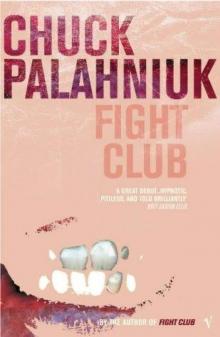 Fight Club
Fight Club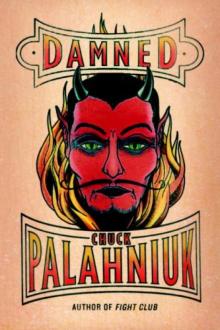 Damned
Damned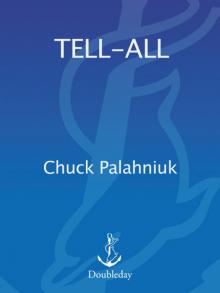 Tell-All
Tell-All Choke
Choke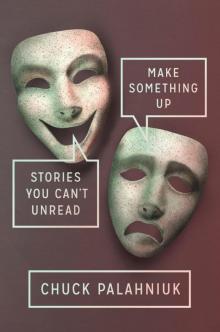 Make Something Up: Stories You Can't Unread
Make Something Up: Stories You Can't Unread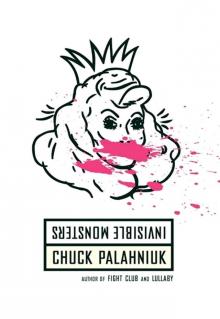 Invisible Monsters
Invisible Monsters Phoenix
Phoenix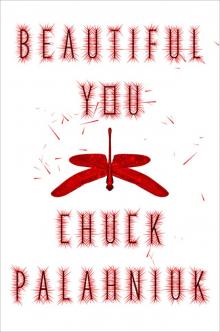 Beautiful You: A Novel
Beautiful You: A Novel Haunted
Haunted Survivor
Survivor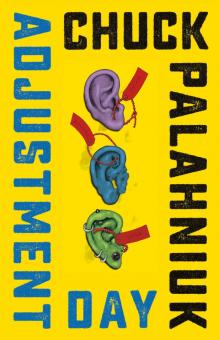 Adjustment Day
Adjustment Day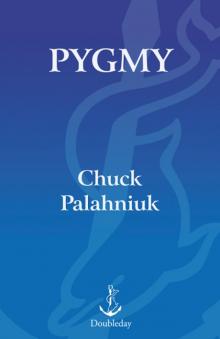 Pygmy
Pygmy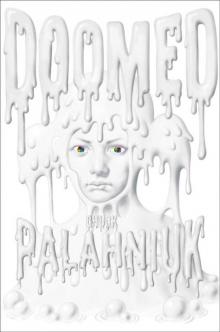 Doomed
Doomed Lullaby
Lullaby Snuff
Snuff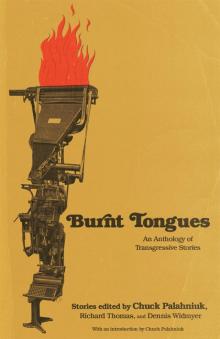 Burnt Tongues
Burnt Tongues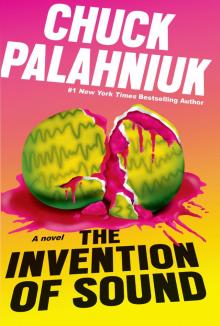 The Invention of Sound
The Invention of Sound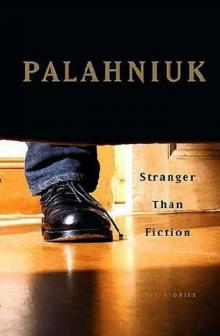 Stranger Than Fiction (True Stories)
Stranger Than Fiction (True Stories)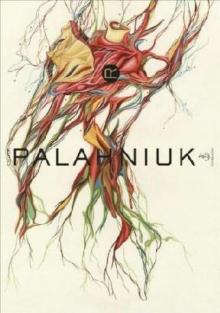 Rant: The Oral History of Buster Casey
Rant: The Oral History of Buster Casey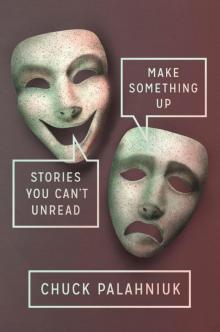 Make Something Up
Make Something Up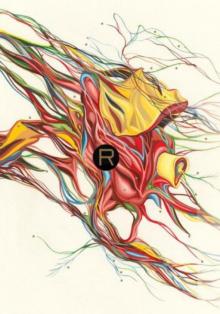 Rant: An Oral Biography of Buster Casey
Rant: An Oral Biography of Buster Casey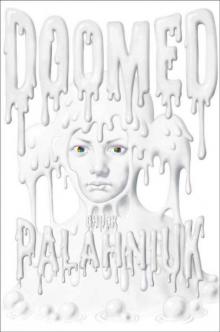 Doomed d-2
Doomed d-2 HOPE AND GORY
HOPE AND GORY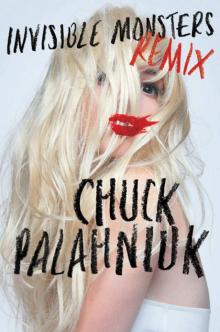 Invisible Monsters Remix
Invisible Monsters Remix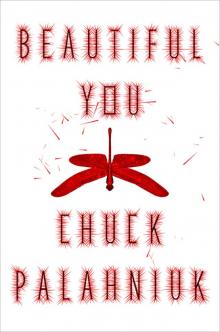 Beautiful You
Beautiful You Fugatives & Refugees
Fugatives & Refugees